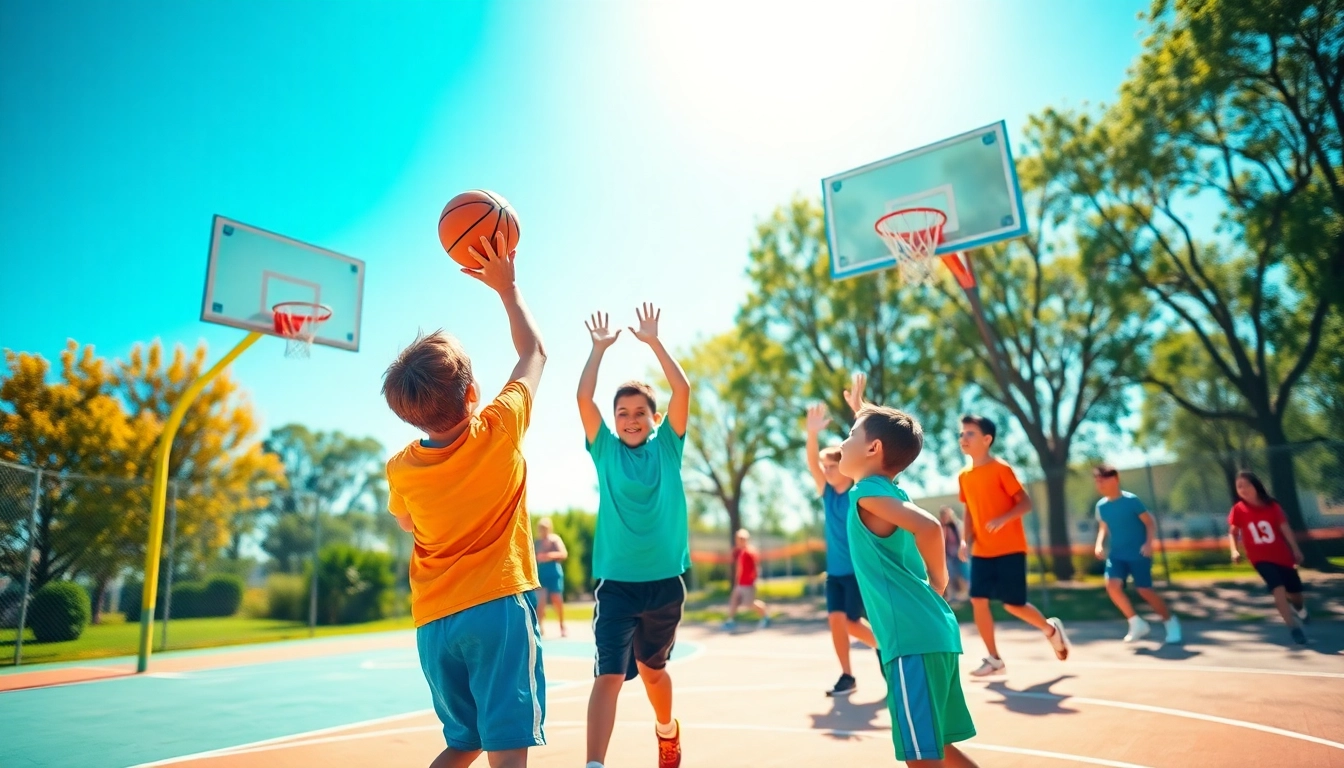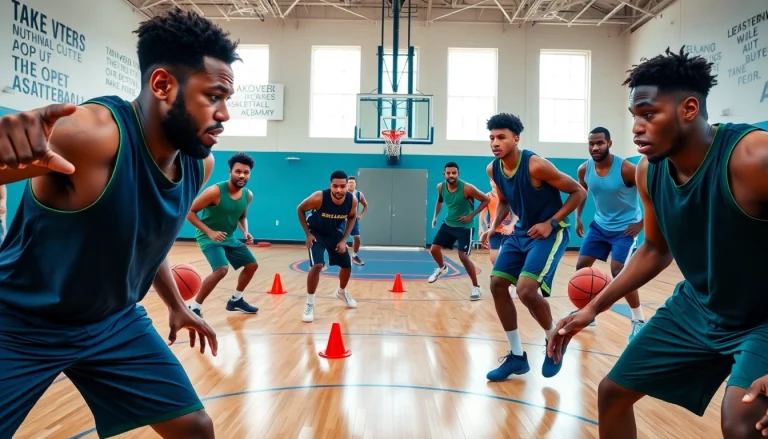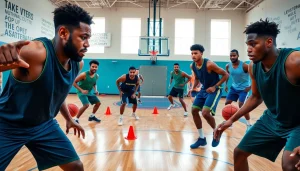Introduction to Youth Basketball
Basketball is more than just a game; it’s a platform for young athletes to develop essential life skills, build friendships, and pursue their passions. For young basketball enthusiasts, the court becomes a canvas where they can express themselves, learn teamwork, and improve their physical fitness. This article explores various dimensions of youth basketball, focusing on its significance, essential skills, effective training methodologies, and the inspirational role of role models in shaping the future of young players.
Understanding the Importance of Basketball for Kids
Basketball offers numerous benefits that contribute to the physical, social, and mental development of children. Engaging in the sport helps to promote a healthy lifestyle, encourages physical activity, and builds resilience. When kids play basketball, they learn to set goals, work towards them, and understand the importance of discipline and commitment.
Additionally, basketball fosters social skills. Players learn the value of teamwork as they work with peers towards a common objective. They experience both victories and defeats, equipping them with resilience and emotional intelligence that are vital in everyday life.
Benefits of Engaging Young Basketball Enthusiasts
- Physical Fitness: Basketball is an excellent cardiovascular workout that enhances endurance, strength, and coordination.
- Social Skills: Team environments promote communication, cooperation, and conflict resolution.
- Discipline and Focus: Players develop a sense of responsibility as they commit to regular practice and strive for improvement.
- Self-Esteem: Mastering skills and contributing to a team can significantly boost a young player’s confidence.
- Life Lessons: The game teaches important life skills such as time management, strategy, and perseverance.
Overview of Basketball Programs for Youth
Various basketball programs are available for young players, including school teams, community leagues, and summer camps. Programs like NBA Cares emphasize connecting young athletes with professional role models and instilling vital social values through basketball. Many local community centers and schools host clinics designed to teach the fundamentals of the game, ensuring access to engaging and enriching experiences for all youth.
Basic Skills for Young Basketball Enthusiasts
Fundamentals of Dribbling and Shooting
Dribbling and shooting are the cornerstones of basketball. Mastering these skills is crucial for young players to become confident on the court. Dribbling allows players to maneuver the ball while navigating defenders, and effective shooting can determine game outcomes.
To hone dribbling skills, coaches can utilize simple stationary drills. Players should first practice dribbling with both hands, focusing on maintaining control without looking at the ball. Progressing to dynamic drills, such as zig-zag dribbling, helps enhance agility and coordination.
Shooting mechanics also need emphasis. Young players should focus on form: balance, elbow positioning, and follow-through. Drills like “Around the World” can make practicing more engaging while allowing players to build muscle memory.
Passing Techniques for Effective Team Play
Passing is critical in basketball as it creates opportunities for scoring. Young players must learn various passing techniques, including chest passes, bounce passes, and overhead passes. Practicing these passes in a controlled setting can boost their confidence during games.
Team drills that involve passing under pressure, such as ‘keep away,’ can simulate game situations and enhance decision-making and teamwork skills. Through these practices, young athletes learn to anticipate teammates’ movements and make quick decisions, vital for effective gameplay.
Defensive Strategies for Young Players
Defense wins games, and young players must grasp basic defensive principles. Understanding the difference between man-to-man and zone defense, as well as positioning, can significantly impact a game’s outcome. Coaches should introduce concepts like staying low, using quick lateral movements, and maintaining awareness of the ball and the opposing player’s position.
Drills such as “closeout” practice can help players learn how to approach an offensive player and contest shots effectively, while defensive slides drill establishes mobility and agility.
Training Drills to Enhance Performance
Creative Drills for Skill Development
Training drills don’t have to be repetitive to be effective. Creative drills incorporating fun elements can keep young players engaged and motivated. For example, games such as “Sharks and Minnows” serve to enhance dribbling skills while adding a competitive edge. Additionally, obstacle courses that require a mix of dribbling, shooting, and passing can improve overall skills while making learning enjoyable.
Fun Games to Foster Teamwork
Integrating games into practice fosters teamwork, builds camaraderie, and enhances skills. Activities like ‘3-on-3 tournaments’ are excellent for encouraging team play, while ‘shooting contests’ can introduce a fun competitive spirit. These formats not only keep practice lively but also build crucial teamwork skills as players work together towards a common goal.
Using Fitness to Improve Basketball Skills
Physical fitness plays an essential role in basketball performance. Incorporating fitness training into basketball practices is vital. Agility ladders can improve foot speed and coordination, while strength training, focusing on core muscles, enhances stability and power. Additionally, incorporating conditioning drills, such as wind sprints, can increase endurance levels, ensuring players have the stamina to perform effectively throughout an entire game.
Inspiring Young Athletes Through Role Models
Highlighting Success Stories in Basketball
Role models in sports can profoundly influence young players. Sharing success stories of professional athletes who overcame adversity can inspire young basketball enthusiasts to pursue their dreams against all odds. Stories of athletes like Stephen Curry, who was overlooked in his early career, serve as reminders that perseverance can lead to greatness.
Community events featuring local heroes or alumni from high school teams can create connections that motivate young players and promote aspirations. Being able to meet role models in person can leave a lasting impression and foster devotion to the sport.
Engaging Young Fans: How Role Models Motivate
The impact of role models extends beyond merely playing well. Engaging young fans through community events, camps, and social media can build loyalty towards the sport. Initiatives such as NBA Cares exemplify how professional players engage with their communities, inspiring youth while developing connections in the community.
Players fostering relatability—whether through candid social media interactions or participatory events—helps young fans feel inspired and close to their idols, instilling the notion that they too can make a mark in the world of basketball.
Community Involvement and Support for Young Players
Community support plays a crucial role in nurturing young talents. Local organizations that offer basketball clinics, youth leagues, and training camps not only provide opportunities for practice but also foster relationships among peers and mentors. Collaborations between schools and community centers can help create an open environment that encourages participation from all young enthusiasts.
Encouraging local businesses to sponsor youth programs can also increase resources available for training, uniforms, and facilities needed to grow. A strong, supportive community can significantly enhance the experience for young players while making basketball accessible to everyone, regardless of background.
Resources for Young Basketball Enthusiasts
Books and Educational Materials on Basketball
Books on basketball can provide young enthusiasts with new insights and inspiration. Titles such as “Shooting Stars” by LeBron James and “The Crossover” by Kwame Alexander offer compelling narratives that not only excite young readers but also teach valuable lessons around resilience, teamwork, and dedication. Compiling a reading list that includes biographies, instructional guides, and fiction can further enrich a young player’s understanding of the sport.
Online Platforms and Teaching Tools for Youth Training
Leveraging technology can significantly enhance the training experience for young players. Platforms such as YouTube offer countless instructional videos on drills, techniques, and game analysis. Interactive apps can keep players engaged by tracking their progress and providing feedback. Websites offering free resources for drills can act as a reference for coaches and young players.
Local Organizations Supporting Young Basketball Enthusiasts
Various local organizations work to provide support and development opportunities for young basketball enthusiasts. Programs run by community associations and schools focus on enhancing skills, while also providing clinics to teach the fundamentals of the game. Highlighting these organizations within communities ensures that resources are accessible, fostering a culture that encourages youth to participate in sports and physical activities.























+ There are no comments
Add yours